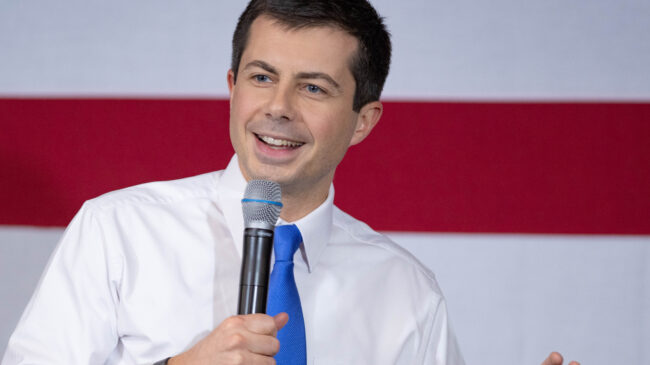While fuel taxes have largely worked well for decades as a means for funding roads and highways, they now suffer from a number of problems. The increasing fuel economy of today’s vehicles makes fuel taxes less effective over time, as does the increased use of electric vehicles and other alternative fuel vehicles that avoid paying fuel taxes altogether.Meanwhile, cities and states are increasingly diverting fuel tax revenues away from road and highway maintenance and operations to light rail and other transit. In addition, the cost of repairing and maintaining roads continues to rise.
U.S. Secretary of Transportation Pete Buttigieg recently highlighted the potential of mileage-based user fees (MBUFs) to provide a replacement for fuel taxes. But Buttigieg received massive blowback from both sides of the political aisle.
Yet, by treating roadways like a utility, similar to power or water, we would be strengthening the users-pay principle. As Buttigieg noted, just as power or water bills are mostly based on the rate of use of those services, paying for roads should follow utility charging principles: “If we believe in that so-called user-pays principle, the idea that part of how we pay for roads is you pay based on how much you drive.”
While the Biden administration’s $2.3 trillion American Jobs Plan will wisely not include any provisions for mileage-based user fees since the nation isn’t quite ready for a national program, more state governments should consider implementing pilot programs to trial MBUFs as a replacement for fuel taxes.
Even as somes states increase their gas taxes to try to make up some of the growing shortfalls, federal fuel tax rates have not changed since 1993. The increased use of electric and fuel-efficient vehicles, while reducing greenhouse gas emissions, makes funding highways and roads via gas taxes more difficult. As with raising fuel tax rates, assessing special fees on electric and alternative-fuel vehicle owners varying fees to compensate for not paying fuel taxes serve as an ad hoc, clunky substitute for what is obvious and easier to do for other utilities: charging the people that use them relative to direct user charges.
Of all the objections to mileage-based user fees, two complaints appear the most often: the “double taxation” effect of MBUFS if they were added to existing fuel taxes, rather than replacing fuel taxes, and potential personal privacy issues related to charging by miles driven.
While opponents, and even some proponents, of MBUFs see them as an addition to existing fuel taxes, the MBUF pilot programs that have been tested, as well as the trade group Mileage-Based User Fee Alliance (MBUFA), all recommend using mileage-based user fees to replace fuel taxes, not complement them. Reason Foundation’s Adrian Moore outlined five principles that should guide mileage-based user fee programs as they’re developed, starting with, “Road usage charges should replace fuel taxes, not supplement them.”
Taxes are meant to cover compulsory government services that have limited means to collect revenue. But MBUF revenues are tied directly to the use of the road assets that they fund. Administrative fees that exist on some utility bills are often more accurately referred to as taxes, few (if any) would argue that paying a water use rate is a “tax” since the bulk of that payment is tied directly to the use of water itself, just as MBUFs would rely on revenues from direct road use.
On privacy, Moore notes, “Road use charges must provide for user privacy and, in the event of shared data, must ensure that users’ data are protected.”
One way to address privacy concerns is to provide road users with a variety of collection options, which was made possible in Oregon’s test MBUF program, OReGO, where participants pay 1.8 cents for each mile they drive. To address privacy issues, Oregon tapped into private-sector expertise to deliver privacy options to drivers.
Private vendors participating in the pilot developed and delivered several options for assessing mileage-based user fees. Options range from more manual-based approaches using car odometers to value-added diagnostic services that rely on GPS receivers that prevent the access of drivers’ location data— as opposed to transmitters or transceivers that do provide that capability—while providing the company the ability to monitor vehicle telemetry and health in ways usually not available to motorists without obtaining expensive equipment.
Existing technologies used to monitor road use for MBUF programs have maintained privacy and security by keeping all data stored inside the vehicle, and while only reporting the most basic information back to the state’s program vendors: road type and distance.
Also noteworthy is the information transfer only works in one direction: Cars report their mileage information to the vendors, but the vendors cannot tap into the vehicles themselves. Pilot programs like OReGO have shown great promise and available technologies exist to make MBUFs effective and secure.
Keeping mileage-based user fees out of the proposed Biden infrastructure bill was likely the right choice. The next federal surface transportation reauthorization bill is likely to continue funding state mileage-based user fee pilot programs and may get started on a national pilot, which needs to be well-designed and supported by stakeholders.
Transportation Secretary Buttigieg was correct to suggest mileage-based user fees as a long-term strategy for preserving and strengthening the users-pay funding approach to roads. Gas taxes aren’t a sustainable way to fund today’s roads and highways. While still in the early stages of testing and implementation, mileage-based user fees should be embraced as a means to make road funding more predictable, sustainable, equitable, as well as by keeping funding in the hands of users.

